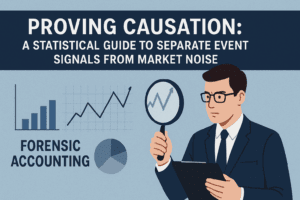Guardianship cases hang in the balance when financial exploitation threatens the assets of vulnerable individuals. Forensic accounting services frequently become the deciding factor between protection and devastation for wards whose financial wellbeing depends on proper oversight. When family members or appointed guardians mismanage funds or deliberately divert assets, these specialized financial investigations bring critical evidence to light that would otherwise remain hidden.
Additionally, forensic accountants provide the financial clarity courts need to make informed decisions about a ward’s estate. Despite stringent legal protections, financial abuse in guardianship arrangements often goes undetected for years, causing irreversible damage to estates meant to support vulnerable individuals for their lifetime. Furthermore, complex financial structures and intentionally obscured transactions require the expert analysis that only trained forensic CPAs can provide.
This comprehensive guide examines how forensic accounting transforms guardianship proceedings, from uncovering subtle patterns of financial misconduct to presenting compelling evidence in court. We’ll explore the methodologies used to trace missing funds, evaluate the true state of a ward’s assets, and ultimately protect the financial interests of those who cannot protect themselves.
Understanding the Financial Stakes in Guardianship Cases
Financial guardianship empowers individuals to manage assets for those deemed incapable of handling their own affairs. This legal arrangement, while essential for protection, creates substantial financial vulnerabilities that require careful oversight and specialized forensic accounting services to detect and prevent abuse.
Guardianship as a Legal and Financial Framework
Guardianship serves as both a legal safeguard and a complex financial management system. At its core, a guardian of the estate (sometimes called a conservator) assumes control over the ward’s financial resources with broad powers to make financial decisions, enter into contracts, conduct estate planning, file lawsuits, sell real estate, and apply for government benefits [1]. This arrangement creates a fiduciary relationship, obligating the guardian to “act primarily for another’s benefit and subject to the standard of care imposed by law or contract” [1].
The financial dimensions of guardianship extend beyond day-to-day money management to include strategic financial planning, asset valuation, and investment oversight. Guardians must manage the estate frugally while ensuring sufficient funds for the “comfort and suitable support of the ward” and their dependents [1]. Moreover, guardians bear responsibility for investigating potential government benefits to conserve estate assets [1].
Common Financial Risks in Adult Guardianship
The financial stakes in guardianship cases are extraordinarily high, with elder financial abuse and fraud costing older Americans over $2.90 billion annually [2]. According to the National Adult Protective Services Association, one in twenty older adults report experiencing financial mistreatment [2]. Troublingly, 90% of abusers are family members or trusted others [2].
Common risks include:
- Misappropriation of funds through unauthorized transactions
- Outright theft of property or assets
- Fraudulent changes to wills or powers of attorney
- Undisclosed transfers of assets
- Commingling of guardian and ward finances
- Excessive fees and billings
In Florida, complaints against professional guardians included allegations of theft, mishandling of ward funds, and financial exploitation [3]. One investigation identified hundreds of allegations of physical abuse, neglect, and financial exploitation by guardians in 45 states between 1990 and 2010 [1]. In 20 selected cases, guardians stole or improperly obtained $5.4 million from 158 incapacitated victims [1].
Why Financial Mismanagement Often Goes Undetected
Financial mismanagement in guardianship cases frequently remains hidden for years due to systemic failures in oversight. Courts tasked with monitoring guardians often lack adequate resources, leading to insufficient review of financial reports. In New York, just 157 examiners are responsible for reviewing reports of 17,411 wards, with only about a dozen judges to check their work [3]. As a result, annual assessments can take years to complete, leaving judges without critical information about wards’ welfare [3].
Although guardians typically must file periodic financial reports, monitoring systems frequently prove inadequate. Florida’s Office of Public and Professional Guardians relied on an optional self-monitoring questionnaire that many guardians never completed [3]. Similarly, investigations of serious allegations—such as guardians failing to pay for housing or isolating wards from family—were initiated 16 to 28 business days after receipt of complaints, well beyond the required 10-day timeframe [3].
Courts often rely primarily on financial paperwork rather than in-person visits to determine a ward’s well-being [3]. This approach creates opportunities for fraud since a skilled guardian can make transactions appear legitimate on paper while concealing improper activities. Furthermore, those under guardianship face significant barriers to accessing basic information about their finances, making it difficult to dispute guardian actions or lodge complaints [4].
Without specialized forensic accounting services, these financial irregularities often remain buried in complex documentation, allowing exploitation to continue unchecked until estates are significantly depleted.
How Forensic Accounting Uncovers Hidden Financial Abuse
In complex guardianship disputes, specialized financial investigators serve as the last line of defense against exploitation. Forensic accounting services employ methodical approaches to expose financial wrongdoing that conventional audits might miss, often revealing evidence crucial for protecting vulnerable individuals.
Tracing Unauthorized Transactions Across Accounts
Forensic accountants excel at following money trails through sophisticated tracking techniques. They methodically examine bank statements, credit card activities, investment accounts, business records, and real estate transfers to reconstruct the flow of funds [5]. This comprehensive approach uncovers transactions that don’t align with the ward’s best interests.
The investigation typically begins by building a complete financial profile of the ward and guardian. Forensic accountants compile tax returns, bank statements, investment records, payment histories, and property documents to establish baseline financial patterns [6]. Through this process, they identify irregular activities like:
- Regular withdrawals to unlisted accounts
- Unexplained “gifts” to individuals not named in estate documents
- Dissolution of valuable assets before death
- Transfers just below reporting thresholds—often signaling intentional concealment [5]
Consequently, forensic accountants create transaction timelines that expose shell games played with ward assets. In one Florida case, investigators discovered a guardian had transferred ward funds through multiple personal and business accounts in a classic money-laundering scheme [7]. Bank records revealed a USD 55,197 teller withdrawal signed by the guardian as “Guardian for the Ward”—funds never disclosed to the court nor listed on the initial verified inventory [7].
Identifying Coerced Changes in Wills and POAs
Power of attorney abuse can manifest through unauthorized spending, exceeding granted powers, or through fraudulent document creation [8]. Forensic accountants specifically examine changes to estate planning documents for signs of manipulation or coercion.
Key warning signs include sudden revisions that disproportionately benefit one individual, particularly when changes occur during periods of vulnerability [9]. Forensic accounting investigations verify document authenticity and uncover forged or altered paperwork. In one notable case, investigators performed an extensive forensic examination on a bank statement and determined it had been altered and forged—a common method of asset concealment in white-collar fraud [7].
The timing of document changes receives particular scrutiny, especially those made when the ward was experiencing illness, emotional distress, or isolation [9]. Indeed, isolation tactics often precede financial exploitation, with manipulators deliberately restricting access to information and outside contacts [9].
Detecting Undisclosed Asset Transfers
Skilled forensic accountants employ numerous techniques to uncover hidden assets. They conduct thorough public records searches examining property records, business filings, and sometimes social media accounts to discover concealed transfers [10]. Digital forensic analysis provides another powerful investigative avenue, examining devices for evidence of:
- Email communications with suspected co-conspirators
- Hidden accounting software or spreadsheets tracking undisclosed accounts
- Web browsing history indicating financial activities
- Electronic signatures on unauthorized documents [6]
Furthermore, forensic investigators perform lifestyle analyzes, comparing reported income with actual spending patterns to identify discrepancies [10]. This approach often reveals income sources or assets inconsistent with documented finances.
Throughout the investigation process, forensic accountants trace funds from source to final disposition, examining canceled checks not only for payment information but also for deposit account details that may lead to previously unknown accounts [6]. They also analyze ATM withdrawals and credit card cash advances for patterns indicating areas where assets might be concealed [6]. These methodical examinations frequently reveal financial misconduct that would otherwise remain hidden, ultimately protecting vulnerable wards from devastating exploitation.
The Forensic CPA’s Role in Litigation Strategy
Beyond investigation, forensic CPAs fulfill critical roles in guardianship litigation where their expertise often determines case outcomes. Unlike standard accountants, these professionals bring specialized skills in presenting complex financial findings that courts can understand and act upon effectively.
Expert Testimony in Guardianship Hearings
Forensic accountants serve as expert witnesses whose testimony carries substantial weight in guardianship proceedings. Their court appearances require extensive preparation—typically including detailed reports that document financial irregularities through charts, graphs, and timelines. Prior to hearings, these specialists collaborate with attorneys to anticipate cross-examination questions and prepare responses that maintain credibility under pressure.
Throughout testimony, forensic CPAs maintain unwavering objectivity, regardless of which party engaged their services. This impartiality strengthens their position as the court’s financial interpreter rather than an advocate for either side. Effective expert witnesses balance technical accuracy with clear explanations, avoiding accounting jargon whenever possible.
Supporting Legal Teams with Financial Evidence
Behind the scenes, forensic accounting services provide critical litigation support through:
- Document organization and analysis for discovery
- Preparation of financial interrogatories and document requests
- Development of demonstrative evidence for trial
- Assistance with deposition preparation
The most effective forensic accountants work alongside attorneys from case inception rather than being brought in at the last minute. This early involvement allows them to guide investigation strategy, ensuring relevant financial documents are properly requested and preserved.
Meanwhile, these professionals excel at identifying financial inconsistencies that may not be immediately apparent to legal teams. Their specialized training enables them to recognize patterns of exploitation that might otherwise remain hidden within seemingly legitimate transactions.
Clarifying Complex Financial Data for Judges and Juries
Perhaps most importantly, forensic CPAs translate intricate financial information into understandable concepts for non-financial decision-makers. This translation requires distilling months or years of financial investigation into clear, compelling narratives supported by focused visual aids.
Effective forensic witnesses understand that presenting every detail can overwhelm court proceedings. Instead, they highlight key transactions and patterns that demonstrate financial misconduct. This selective presentation approach helps judges focus on the most relevant evidence without getting lost in excessive data.
Financial visualization techniques—including timeline charts, transaction flow diagrams, and comparative analyzes—play crucial roles in helping courts understand complex asset movements. These visual tools transform abstract numbers into concrete patterns that clearly illustrate exploitation or mismanagement, making financial evidence accessible even to those without accounting backgrounds.
Safeguarding the Ward’s Estate Through Financial Oversight
Proactive financial oversight forms the foundation of effective guardianship protection. Forensic accounting services provide critical preventive measures that protect vulnerable individuals before exploitation occurs, creating financial safeguards that address unique challenges in guardianship arrangements.
Asset Valuation for Real Estate and Business Interests
Accurate asset valuation serves as the starting point for effective financial oversight. Professional forensic accountants employ standardized methodologies to establish baseline values for complex assets that ordinary financial statements might inadequately capture. Real estate holdings typically undergo thorough comparative market analysis, while business interests receive detailed examination including revenue verification, expense analysis, and competitive positioning.
For real estate specifically, forensic accountants examine property conditions, ownership structures, and encumbrances that might affect true value. Similarly, for business interests, these professionals analyze operational metrics alongside financial statements to identify discrepancies that could indicate undervaluation or concealment.
Implementing Financial Controls and Audits
Effective guardianship protection relies on robust financial controls that create accountability. Primarily, these include:
- Separation of duties requiring multiple approvals for significant transactions
- Regular external audits by independent forensic accounting services
- Transaction limits requiring court approval beyond set thresholds
Regular forensic reviews verify expenditure appropriateness and ensure all transactions align with the ward’s needs and financial plan. Straightaway, anomalies trigger deeper investigation, creating a deterrent effect that discourages potential exploitation.
Monitoring Investment Portfolios for Irregularities
Investment oversight requires specialized attention to both performance metrics and transaction patterns. Forensic accounting professionals evaluate investment strategies against established benchmarks while monitoring for inappropriate risk levels or unsuitable investment vehicles.
Routine oversight identifies performance inconsistencies that might indicate self-dealing or commission-driven investments serving the guardian’s interests above the ward’s. In brief, forensic accountants verify that investment strategies align with court-approved plans and the ward’s needs rather than generating excessive fees or commissions.
Through these structured oversight mechanisms, forensic accounting services create protective frameworks that safeguard vulnerable individuals’ assets while establishing documentation trails that support legal intervention if exploitation attempts occur.
Case Studies: When Forensic Accounting Changed the Outcome
Real-world cases demonstrate the critical impact of forensic accounting services in guardianship matters. These professional interventions have repeatedly turned seemingly hopeless situations into victories for vulnerable wards and their families.
Recovery of Misappropriated Funds in a Multi-Million Dollar Estate
The scale of guardian financial abuse often reaches staggering proportions. In one comprehensive investigation, guardians stole or improperly obtained $5.40 million from 158 incapacitated victims across 15 states and the District of Columbia [1]. In Missouri, a former taxi driver appointed as guardian embezzled more than $640,000 from an 87-year-old man with Alzheimer’s disease. The funds were used to purchase a Hummer and write checks to exotic dancers. The case concluded with the guardian receiving an 8-year prison sentence and restitution order [1].
Similarly, in Alaska, a private guardianship agency’s management systematically stole at least $454,000 over four years from at least 78 victims. The agency’s executive director misappropriated wards’ funds for personal expenses including credit card bills, mortgage payments, medical expenses, and children’s camp fees [1].
Preventing Exploitation Through Early Detection
Timely forensic accounting intervention often prevents devastating financial losses. In one notable case, an elderly woman under guardianship had her will altered to benefit her guardian. Fortunately, a forensic accountant uncovered irregularities in signatures and financial transactions connected to the change. This evidence led to the guardian’s removal and subsequent criminal charges [11].
Another case involved a guardian systematically siphoning funds from a ward’s account for personal use. Through meticulous transaction tracing, the forensic accountant followed the money trail and helped recover much of the stolen funds [11]. These cases highlight why experts recommend engaging forensic accountants “as soon as you suspect financial discrepancies in an estate” [12].
Resolving Inheritance Disputes with Financial Clarity
Forensic accountants excel at resolving complex inheritance conflicts through objective financial analysis. In one case, adult children settling their father’s estate discovered a pattern of large withdrawals and the quiet sale of family property during his final years. These transactions, executed under a power of attorney held by his second spouse, raised questions about whether they reflected the father’s intentions [13].
Through asset tracing and financial reconstruction, forensic accountants provided the financial clarity needed to resolve the dispute. Their ability to “follow the trail of funds across accounts and entities” [13] proved essential for identifying undisclosed transfers and reconciling distribution instructions. This financial transparency ultimately ensured fair asset distribution according to the ward’s genuine wishes.
Conclusion
Forensic accounting services stand as the crucial differentiator between protection and exploitation for vulnerable individuals under guardianship arrangements. Throughout this analysis, we have seen how specialized financial investigators detect patterns of abuse that traditional oversight mechanisms frequently miss. Their methodical examination of transaction histories, document authenticity, and asset transfers brings hidden financial misconduct into the light, often revealing exploitation schemes that have operated undetected for years.
Financial stakes remain extraordinarily high when guardians control estate assets. Consequently, the forensic CPA’s role extends far beyond basic accounting—these professionals serve as financial interpreters who transform complex numerical data into compelling evidence courts can understand and act upon. Their expertise proves particularly valuable when addressing unauthorized transactions, manipulated estate documents, or deliberately concealed assets.
Proactive engagement of forensic accounting services creates protective frameworks that significantly reduce exploitation risks. Asset valuation establishes accurate baseline measurements, while structured financial controls ensure transactions align with the ward’s best interests. Additionally, regular forensic reviews create documentation trails that support legal intervention when necessary.
Case studies clearly demonstrate how forensic accounting changes outcomes in guardianship proceedings. Detailed financial investigations have recovered millions in misappropriated funds, prevented ongoing exploitation through early detection, and resolved inheritance disputes that would otherwise leave vulnerable individuals without financial protection.
The financial wellbeing of those under guardianship ultimately depends on rigorous oversight systems. Forensic accounting provides this essential protection through specialized techniques that expose financial misconduct before estates suffer irreversible damage. Though courts and monitoring agencies often lack resources for comprehensive financial review, forensic accountants fill this critical gap—safeguarding vulnerable individuals from those who would exploit their position of trust for personal gain.




